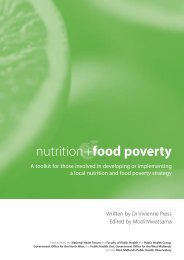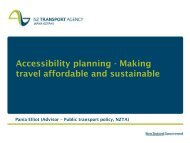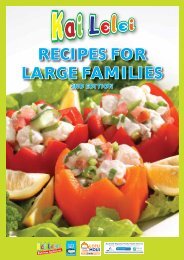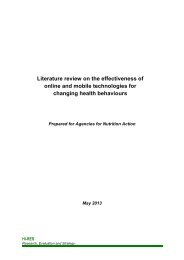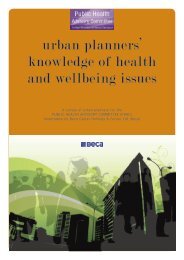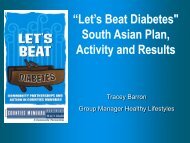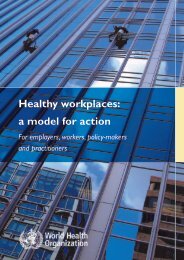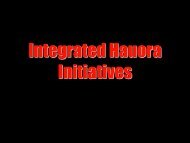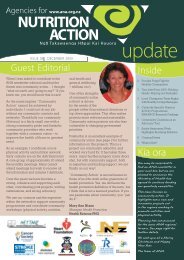enhancing food security and physical activity for maori, pacific and ...
enhancing food security and physical activity for maori, pacific and ...
enhancing food security and physical activity for maori, pacific and ...
- No tags were found...
You also want an ePaper? Increase the reach of your titles
YUMPU automatically turns print PDFs into web optimized ePapers that Google loves.
Enhancing Food Security <strong>and</strong> Physical Activity <strong>for</strong> Māori, Pacific <strong>and</strong> Low-income Peoples2.4 Fringe lender responsibilityTolotea Lanumata <strong>and</strong> Louise SignalSummaryThe participants in the ENHANCE workshop on money available in householdsidentified debt as a contributing factor to <strong>food</strong> in<strong>security</strong> amongst Maori, Pacific <strong>and</strong>low income households. In particular, the credit practices of the fringe lending marketcreate a culture of dept dependency, escalating debt <strong>and</strong> stress in some households.Subsequent analysis of the New Zeal<strong>and</strong> literature <strong>and</strong> the results of the keyin<strong>for</strong>mant interviews reiterate the same concern. There is also mounting concerninternationally in the US, Canada, the UK <strong>and</strong> Australia on the impact of the fringelending market on low income <strong>and</strong> vulnerable communities.Fringe lenders are often: small, owner-operated, specialising in personal cash loans;lending at higher interest rates than mainstream lenders; loan small amounts <strong>and</strong>have short term repayments; provide immediate cash with few credit checks.The draft Credit Re<strong>for</strong>ms (Responsible Lending) Bill <strong>and</strong> the ‘Fairness in Lending’report by Finsec offer valuable suggestions <strong>for</strong> debate <strong>and</strong> action around responsiblelending in New Zeal<strong>and</strong> which are very timely, given the current economic downturn.Action in this area is also particularly appropriate given the increased attentioninternationally on lender responsibility in the banking <strong>and</strong> finance industries.Recommendations from this research are as follows:• Introduce regulation of fringe lenders• Improve access to af<strong>for</strong>dable credit <strong>for</strong> low-income households• Increase financial literacy <strong>for</strong> users of the fringe lending market.Problem DefinitionThe participants in the ENHANCE workshop on money available in householdsidentified debt as a contributing factor to <strong>food</strong> in<strong>security</strong> amongst Māori, Pacific <strong>and</strong>low-income households. Debt reduces the amount of money available to spend on<strong>food</strong>. The concern, however, was accumulating debt, <strong>and</strong> in particular the role of the‘fringe lending’ market operating in South Auckl<strong>and</strong> <strong>and</strong> other low-income areas.Participants identified the need <strong>for</strong> the fringe lending market to be more responsible indealing with Māori, Pacific <strong>and</strong> low-income communities. It was argued that this couldreduce indebtedness <strong>and</strong> thus free up money that would have been used to pay offhigh interest loans, to buy <strong>food</strong>.The recent report ‘Beyond Reasonable Debt’ by the Families <strong>and</strong> RetirementCommissions indicates that a lot of New Zeal<strong>and</strong> families are in debt <strong>and</strong> this is nonmortgagedebt. 1 Furthermore, a report by the Ministry of Consumer Affairs identifiedfringe lending market practices as detrimental to vulnerable consumers, particularlyPacific consumers. 2 Most importantly, it was found that the most common reason <strong>for</strong>borrowing was to meet everyday household expenses.43



